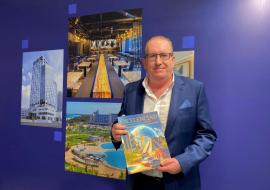Ruben del Valle Alvarez. Cuba’s Deputy Minister of Culture


<b> Q- Can we say that Cuba’s tourism is not merely sun and sand, but also a tourism with a sustained cultural development in it? </b>
A- I’ve always said that the one thing that tells Cuba from other travel destinations in the Caribbean is the assortment of cultural values that our country cherishes and that the Revolution has boosted up. That has been clearly seen in a number of national and international events, like the Workshop on Cultural Diversity and Tourism held in Havana under the auspices of UNESCO and that gathered experts from all around the world.
<b> Q- Are Cuba’s cultural roots and their development present in programs being offered to foreign tourists? </b>
A- Yes, they are. That’s something we keep in mind all the time. Today, UNESCO not only fosters the care and preservation of the tangible cultural heritage, like buildings and monuments- but also of the entire intangible cultural heritage, and Cuba has plenty of it to show off. Quite recently, UNESCO declared Santiago de Cuba’s French Toumba “a Masterpiece of Mankind.” That’s the first example of intangible cultural heritage that gets such a high distinction.
<b> Q- What initiatives are underway to strengthen the ties between the ministries of culture and tourism? </b>
A- We’re working on many initiatives. Cuba’s joint working effort between the ministries of culture and tourism –teamed up with the Cuban League of Writers and Artists (UNEAC) is one of a kind. We comply with the agreements signed by the higher-ups of both institutions and this compliance has allowed us to buttress that relationship with each passing year, even though there’s still a long way to go.
<b> Q- Have you set out to give hotels a nice ambience by means of Cuban cultural values? </b>
A- Absolutely. That’s a strategic course of action. We’ve managed to enhance the presence of Cuban handicrafts and fine arts, as well as music, in order to underscore the sense of Cuban identity. Besides, as time rolls on, both hotel and extra-hotel facilities will become basic elements of the island nation’s cultural heritage.
<b> Q- What role do travel agencies and tour operators play in the strategy of promoting Cuba’s cultural values? </b>
A- The strategy is to make all travel agencies move toward cultural tourism. That’s an objective for both ministries. The role that the Ministry of Culture and its institutions should play is to provide tourism with all those values. We’ve got some specialized agencies, like Paradiso and San Cristobal. But it’s foolish to believe that just one, two or three agencies all by themselves can pull off such a tremendous effort.
<b> Q- Some agencies have managed to get around the U.S. embargo. What do you think about that? </b>
A- In the latest edition of the Plaza Jazz Festival, led by Chucho Valdes, we saw over a thousand American tourists. In the latest Havana Biennial of the Fine Arts, nearly a thousand U.S. citizens came to Cuba despite the travel ban imposed by Washington. The point is that culture is so powerful and luring that, I think, they could never prevent our two countries from having those kinds of exchanges.
<b> Q- How is the Ministry of Culture going to present itself at the Convention? </b>
A- All the arts are going to be there. We’re going to show the most treasured values of Cuba’s cultural heritage. That’s something that tells Cuba from the rest of travel destinations, the fact that we have better writers and artists. We’ll be accompanied by a group of distinguished cultural personalities who, after all, are the stars of this necessary and indispensable relationship between Cuba’s culture and tourism.














